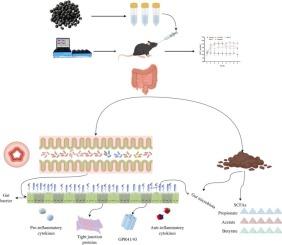Impact of black soybean peptides on intestinal barrier function and gut microbiota in hypertensive mice
IF 3.8
2区 农林科学
Q2 FOOD SCIENCE & TECHNOLOGY
引用次数: 0
Abstract
The aim of the present study was to examine the antihypertensive effect of black soybean peptides (BSP) and investigate the role of these peptides in ameliorating hypertension-induced intestinal damage and modulating gut microbiota. The findings demonstrated that BSP could significantly reduce the blood pressure of mice with diet-induced hypertension (P < 0.001). Simultaneously, BSP effectively inhibited the production of pro-inflammatory factors (IL-17 and TNF-α) and increased the levels of an anti-inflammatory factor (IL-10) in the colon of mouse models of hypertension. Additionally, BSP up-regulated the gene expression of intestinal barrier factors ZO-1, Occludin, and MUC-2, and alleviated the hypertension-induced inflammatory infiltration of colon tissue. Furthermore, the peptides increased the levels of short-chain fatty acids (SCFAs) in the feces and up-regulated the protein expression of the SCFA receptor GPR41/43. The analysis of intestinal microbes showed that BSP could modulate the richness and diversity of the intestinal microbiota in mouse models of hypertension, increase the abundance of beneficial bacteria, decrease the abundance of harmful bacteria, and promote the homeostasis of the imbalanced intestinal microbiota. Notably, BSP exerted a significant protective effect against L-NAME-induced hypertension in mice, demonstrating good outcomes with respect to blood pressure regulation, intestinal protection, and intestinal microbiota balance. Therefore, BSP may ameliorate the harm caused by hypertension and could aid in the prevention of hypertension as a dietary intervention.

黑豆肽对高血压小鼠肠道屏障功能和肠道微生物群的影响
本研究的目的是研究黑大豆肽(BSP)的降压作用,并探讨这些肽在改善高血压诱导的肠道损伤和调节肠道微生物群中的作用。结果表明,BSP能显著降低饮食性高血压小鼠的血压(P <;0.001)。同时,BSP能有效抑制小鼠高血压模型结肠中促炎因子(IL-17和TNF-α)的产生,提高抗炎因子(IL-10)的水平。BSP上调肠屏障因子ZO-1、Occludin、MUC-2的基因表达,减轻高血压引起的结肠组织炎症浸润。此外,这些肽增加了粪便中短链脂肪酸(SCFAs)的水平,上调了SCFA受体GPR41/43的蛋白表达。肠道微生物分析表明,BSP可以调节高血压小鼠肠道菌群的丰富度和多样性,增加有益菌的丰度,降低有害菌的丰度,促进肠道菌群失衡的动态平衡。值得注意的是,BSP对l - name诱导的小鼠高血压具有显著的保护作用,在血压调节、肠道保护和肠道菌群平衡方面表现出良好的效果。因此,BSP可以改善高血压的危害,并可以作为一种饮食干预来帮助预防高血压。
本文章由计算机程序翻译,如有差异,请以英文原文为准。
求助全文
约1分钟内获得全文
求助全文
来源期刊

Journal of Functional Foods
FOOD SCIENCE & TECHNOLOGY-
CiteScore
9.60
自引率
1.80%
发文量
428
审稿时长
76 days
期刊介绍:
Journal of Functional Foods continues with the same aims and scope, editorial team, submission system and rigorous peer review. We give authors the possibility to publish their top-quality papers in a well-established leading journal in the food and nutrition fields. The Journal will keep its rigorous criteria to screen high impact research addressing relevant scientific topics and performed by sound methodologies.
The Journal of Functional Foods aims to bring together the results of fundamental and applied research into healthy foods and biologically active food ingredients.
The Journal is centered in the specific area at the boundaries among food technology, nutrition and health welcoming papers having a good interdisciplinary approach. The Journal will cover the fields of plant bioactives; dietary fibre, probiotics; functional lipids; bioactive peptides; vitamins, minerals and botanicals and other dietary supplements. Nutritional and technological aspects related to the development of functional foods and beverages are of core interest to the journal. Experimental works dealing with food digestion, bioavailability of food bioactives and on the mechanisms by which foods and their components are able to modulate physiological parameters connected with disease prevention are of particular interest as well as those dealing with personalized nutrition and nutritional needs in pathological subjects.
文献相关原料
公司名称
产品信息
索莱宝
SDS-PAGE gels
索莱宝
SDS-PAGE gels
索莱宝
SDS-PAGE gels
 求助内容:
求助内容: 应助结果提醒方式:
应助结果提醒方式:


